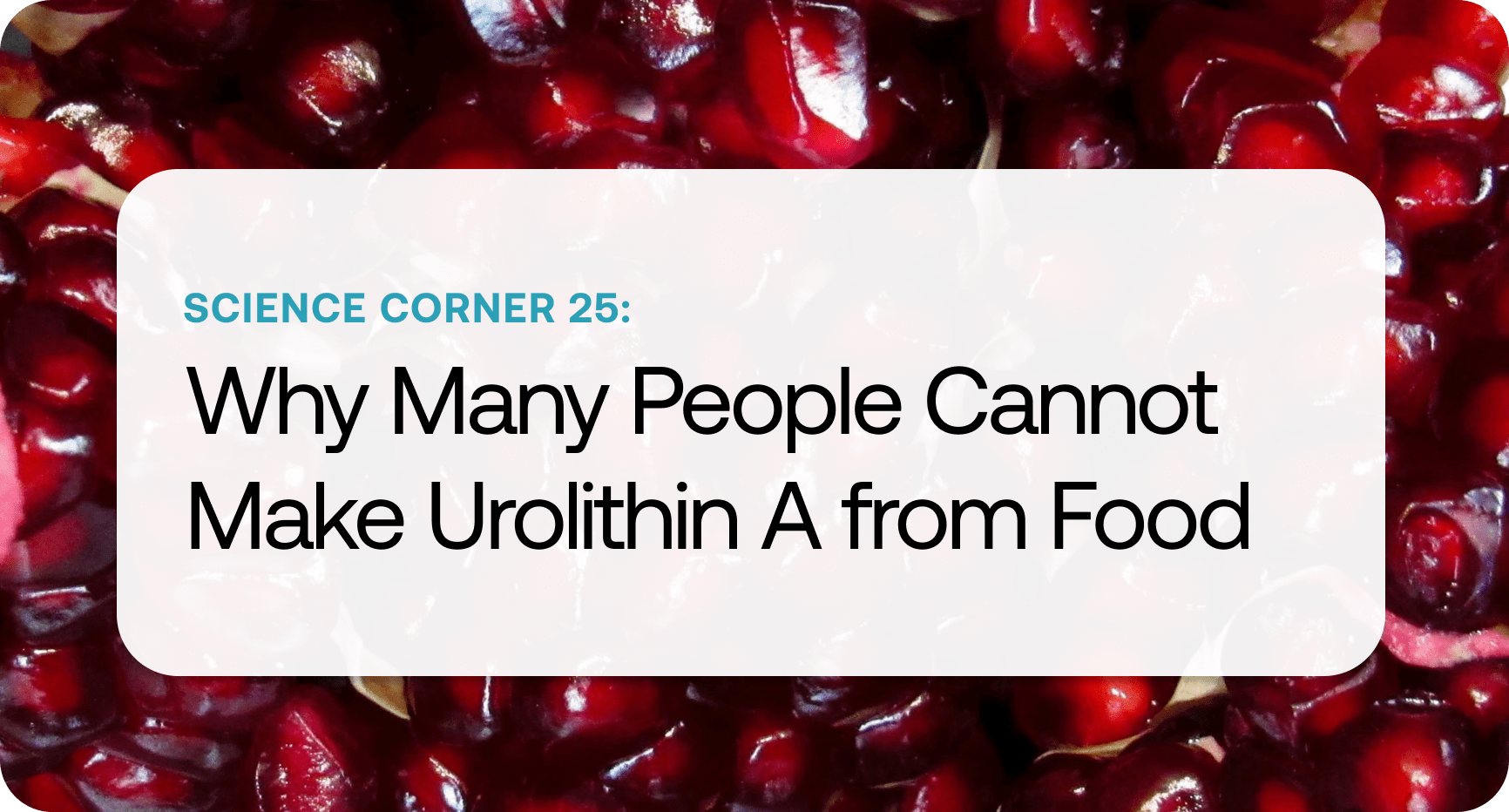Science Corner 25 | Why Many People Cannot Make Urolithin A from Food

Imagine eating pomegranates, berries, and walnuts regularly, convinced you are fueling your cells with one of the most talked-about compounds in longevity science, only to discover you are getting none of it. This is the reality for roughly 60 percent of people who cannot produce Urolithin A from food alone.
In our recent SuppCo Tested report on Urolithin A, we examined product quality, dosing, and the science behind its mitochondrial benefits. One finding from the research world explains why supplementation is not just an option for many, it is the only path to results.
A 2021 clinical study gave 100 healthy adults a standardized serving of pomegranate juice, naturally rich in the ellagitannins that gut microbes can convert into Urolithin A. Only 40 percent produced measurable amounts in their blood. The other 60 percent, despite identical intake, made little or none. The deciding factor was gut microbiome composition, not diet quality.
The food-versus-supplement gap
For producers, diet can raise Urolithin A levels modestly, but still far below doses used in clinical trials. For non-producers, food alone delivers nothing. In the same study, direct supplementation increased plasma levels more than sixfold compared to juice, and it worked for every participant regardless of their microbiome. This means:
If you are a producer, supplementation can boost you from a “trickle” to a clinically relevant dose.
If you are a non-producer, supplementation turns “zero” into meaningful, measurable levels.
Why it matters in daily life
Urolithin A supports mitochondrial health through mitophagy, the process of clearing out damaged cellular powerhouses. Human studies have linked supplementation to improved muscle endurance and markers of healthy aging. Without adequate Urolithin A, you may be missing an opportunity to help your cells function more efficiently, especially important for maintaining strength, energy, and resilience over time.
How to know if you are a producer
A practical route: Try an “ellagitannin challenge” with a high-polyphenol juice for several days, then test blood or urine through a direct-to-consumer lab.
A clinical route: Work with a healthcare provider who can order Urolithin A blood testing and microbiome analysis for definitive results.
For most non-producers, supplementation is the reliable choice. And as the science evolves, from microbiome-targeted probiotics to novel delivery systems, SuppCo will keep you ahead of the curve with updates on the best ways to get this promising compound into your cells.
Common questions about producers and supplementation
Q: If you are a producer, should you still consider taking Urolithin A?
A: Yes. Even natural producers usually generate Urolithin A at levels well below those tested in clinical trials. Supplementation ensures consistent, higher levels that are more likely to translate into real-world benefits.
Q: How many producers are getting enough?
A: Very few. In studies where producers consumed pomegranate juice, blood levels rose modestly, but remained far lower than those achieved through supplementation. That means most producers are not reaching the doses linked with improved muscle endurance and mitochondrial health.
Q: Should older producers take more?
A: Possibly. Both the gut microbiome and mitochondrial efficiency decline with age, so even if you were a strong producer earlier in life, your output may taper off. Supplementation offers a way to reliably maintain levels into older age, when protecting cellular energy systems becomes even more important.
--
Personal note from Jordan
When I first learned that more than half of people cannot make Urolithin A from food, it completely reframed how I think about nutrition advice. It is a good reminder that “eat more of this” is not always enough, and that our biology, especially our microbiome, can change the outcome entirely. I have not yet had my own Urolithin A levels tested, but you can bet it is on my list. For now, I take the supplement to make sure I am not missing out, because the potential benefits for mitochondrial health are too compelling to leave to chance. If you decide to test yourself, I would love to hear what you find.
Citations from this article
Singh, Anurag, et al. "Direct supplementation with Urolithin A overcomes limitations of dietary exposure and gut microbiome variability in healthy adults to achieve consistent levels across the population." European journal of clinical nutrition 76.2 (2022). Link.
